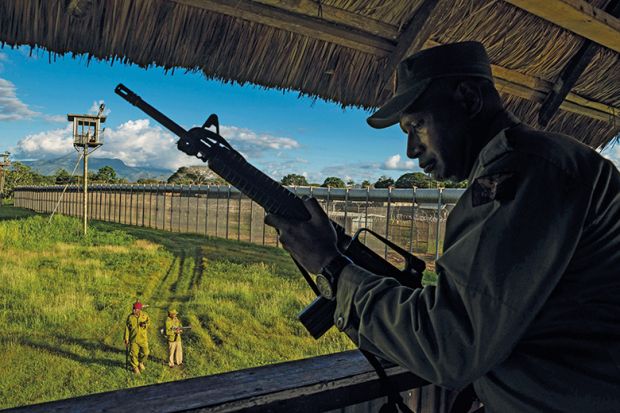As Israel Yafai neared the end of his four-year environmental science course at Papua New Guinea’s University of Natural Resources and Environment (UNRE), he envisaged a future as a professional and – given his standing as student representative council (SRC) president – a community leader.
Instead, he has spent more than six months in Kerevat jail, a few kilometres from the university on New Britain island.
Mr Yafai and several fellow students face charges over the unrest that first engulfed the campus last September, after it emerged that the inaugural cohort of environmental science students would not receive their qualifications.
UNRE’s efforts to accredit the new offerings – a bachelor’s programme in environment and climate change, and a sister course in renewable energy and environmental engineering – had “stalled” after the senior academic leading the process had left for Canada, according to an insider.
About 20 final-year students had spent 5,000 kina (£1,050) each in annual tuition fees and as much again on board and lodgings – considerable sums in a country where salaries typically range between 25,000 kina and 85,000 kina a year.
Mr Yafai said he had pressed the university’s management to resolve the accreditation issue before seeking intervention from the Department of Higher Education, Research, Science and Technology, to no avail.
On the evening of 18 September, the students resolved to boycott classes and stage a peaceful protest as a “last hope and resort to air our grievances”, Mr Yafai told Times Higher Education. The aim was to convince the higher education minister, Don Polye, to visit the campus, accept the students’ petition, suspend the university’s senior management team and appoint interim administrators.
Mr Yafai said he had been conscious of the risks after the university obtained a 2021 court order against student protests. He had instructed colleagues to stay “on the safe side” by refraining from damage or violence.
Nevertheless, as the students retired to their dormitories to prepare for the protest, “some opportunist” seized the moment to do damage. Six university vehicles, some in working order, were torched.
Mr Yafai said he had offered the SRC’s assistance in investigating the crime after the protest concluded. Nevertheless, police arrested 51 protesters, reportedly in a night-time raid, with four student representatives and a community leader held on remand since 20 October.
According to Mr Yafai, they have been charged with arson and committed to stand trial but were still awaiting a date. “Police…failed to obtain substantial evidence and witnesses before arresting us, which result[ed] in innocent students being implicated for the crime we didn’t commit,” he said. “The future that we’ve been working hard and fighting for [has] been destroyed.”
The prisoners were suffering “great mental distress”, food shortages and “dreadful skin diseases”, he said, appealing for international donors to help by funding replacement vehicles. This could prompt the university management, as complainant, to seek court discretion to have the charges dropped.
A university staff member, who asked not to be named, said Mr Yafai had not contributed to the property damage but had made the “mistake” of failing to condemn it. “As the student president, he had to stand with his group or lose face,” they said.
John Warren, a former UNRE vice-chancellor, said he knew the “level-headed” Mr Yafai from weekly runs around campus. “I don’t believe for a minute that he’s been directly involved in any violence or incitement…[although] you only have to sneeze to incite violence in Papua New Guinea.”
UNRE did not respond to a request for comment. Professor Warren, who launched three degrees during his two-year tenure at the university, said he had bent over backwards to ensure that they accorded with regulatory rules – even though “nobody would really care” about such details, in a country where many universities lacked the resources to meet degree requirements.
“Everybody just turns a blind eye to everything unless they’ve got reason to want to attack somebody, in which case they’ll flag up the law, take [people] to court and make their life very unpleasant,” Professor Warren said.
Mr Polye reportedly refused to visit UNRE to discuss the students’ grievances. He told the Papua New Guinea Post-Courier that ministerial intervention was a “last-resort” measure.
“I have encouraged autonomy of the universities including UNRE, and therefore I prefer the autonomous systems of governance and administration are exercised properly by both staff and students,” the minister said.
Ministerial interventions in UNRE leadership have been reported at least twice since Professor Warren fled the country in mid-2018, and replacement Pongie Kichawen was sacked over reportedly “serious” allegations in late 2020.
In early 2022 Wesley Raminai, who was then higher education minister, attempted to replace current vice-chancellor Aisak Pue. The move was foiled after Professor Pue obtained a court injunction. Professor Pue vacated his office six months later following a court ruling that the extension of his term had been unlawful. He returned the following month after Mr Polye, who had just become higher education minister, revoked the changes.
POSTSCRIPT:
Print headline: Demonstration brings jail and distress, not degree
Register to continue
Why register?
- Registration is free and only takes a moment
- Once registered, you can read 3 articles a month
- Sign up for our newsletter
Subscribe
Or subscribe for unlimited access to:
- Unlimited access to news, views, insights & reviews
- Digital editions
- Digital access to THE’s university and college rankings analysis
Already registered or a current subscriber? Login








